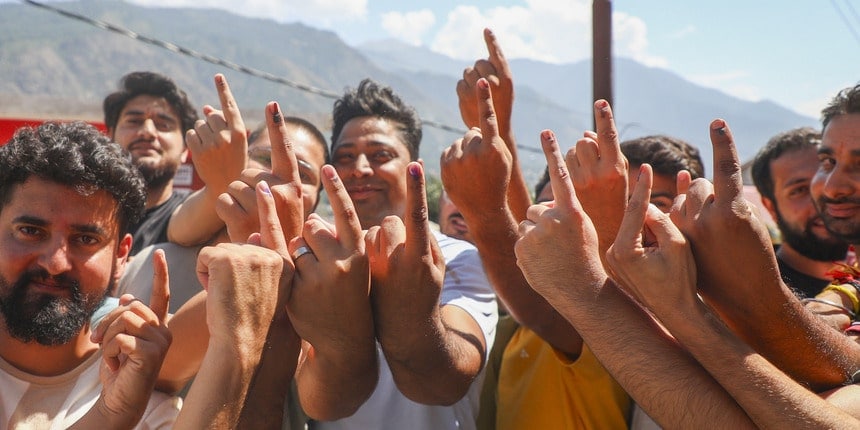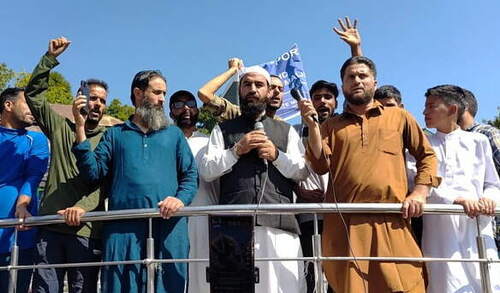Jammu and Kashmir Assembly Elections 2024: Reservation policy a major issue for youth, first-time voters
Aatif Ammad | September 19, 2024 | 01:14 PM IST | 6 mins read
New Jammu Kashmir reservation policy that cut general-category college seats and government job posts pushes youths to travel hundreds of kilometres to vote.

ANANTNAG: Suhai Bhat*, 29, and an MTech in civil engineering, fell just one mark short of the qualifying score for the Jammu and Kashmir Services Selection Board’s (JKSSB) Junior Engineer exam. Still keen on a government job, Bhat immediately resumed preparations for the next exam, this time more confident of his chances.
That changed when a new reservation policy, adopted in March, caused the number of open seats in government jobs and educational institutions to shrink to around 35% of the total. Roughly 70% of J-K’s population is in the “general category”, ineligible for any quota seats or government jobs.
Faced with these odds, Bhat began to reconsider his future. Abandoning his studies, he opened a showroom for car spare parts in his hometown, Tral. “There’s no point in preparing for exams when so few opportunities are left for us,” said Bhat. “You have to be among the toppers to stand a chance, and I don’t see myself making it there. So I’ve started my own business and won’t waste any more time on government job exams.”
Bhat will reconsider that decision only if the policy is revoked and to that end, has voted for a party that promised to do so. Tral voted in Phase-I of the three-phase Jammu and Kashmir legislative assembly elections 2024, on September 18. Phases II and III are on September 25 and October 1. These are the first Jammu and Kashmir elections in a decade and the first since the Jammu and Kashmir Reorganisation Act 2019. "I've never voted before, but this time I will, because I believe if we form our own government, there’s a chance the old reservation policy could return. If that happens, I’ll start preparing for exams again, as becoming an engineer has always been my lifelong dream," he said.
Also read IIT Bombay: 90% UG students to exit early were SC, ST, OBC
This stand is not Bhat’s alone. The reservation policy is an important poll issue among young and first-time voters across constituencies in the union territory. There are roughly 11 lakh voters aged 26 years or under in UT. Practically all significant contenders in the Jammu and Kashmir assembly elections, including the Jammu and Kashmir National Conference (JKNC) and the People’s Democratic Party (PDP) have taken a stand against the reservation policy and promised to revoke it if voted to power.
JK Assembly Elections 2024: New reservation policy
Before March, Jammu and Kashmir had a reservation policy similar to that of other states and UTs, allocating around 50-55% of vacancies in government jobs and promotions and seats in educational institutions to historically-marginalised groups such as the Scheduled Castes (SC), Scheduled Tribes (ST), Other Backward Classes (OBC), and special categories specific to J&K, like candidates from Rural Backward Areas (RBA) and children of state police personnel, commonly known as JKPM. The remaining 45-50% seats were unreserved and meant for the rest of the population, the “general category”.
As per the new Jammu Kashmir reservation policy , notified on March 15, the Jammu and Kashmir administration approved another 10% reservation for newly-included tribes, including Paharis, in the list of Schedule Tribes (ST). The council also approved the addition of 15 new groups in the list of OBCs in the UT and expansion of reservation in favour of OBCs to 8%.
The new reservation policy faced widespread criticism across the union territory, including from those within the reserved categories.
Political parties and prominent figures from J-K condemned the bill, labelling it as unjust to the majority of Kashmiris. Agha Ruhullah, MP from Srinagar, called the bill a catalyst for creating "class and section wars within communities in Kashmir” in parliament. He urged the authorities to either follow the Supreme Court's cap on seat distribution or align it with the region's population.
 Mohammad Sikander Malik, independent candidate, campaigning at Bandipora. (Image: By special arrangement)
Mohammad Sikander Malik, independent candidate, campaigning at Bandipora. (Image: By special arrangement)
Jammu and Kashmir election and promises
As elections were announced in J&K, political parties came up with manifestos and promises. The JKNC was the first to publish its manifesto. Expected to do well in the JK assembly elections, its manifesto says: “The reservation policy will be reviewed and any injustice and imbalance will be corrected”. The promise was welcomed and applauded by youth throughout the union territory.
Mohsin Khan, 23, a master's student at Kashmir University, said: "I'll be voting for the first time solely to oppose the new reservation policy. It's up to us, the youth, to support those who can reverse this illogical policy. If it isn't repealed, open merit candidates might as well stop pursuing education, as it will have no value, and our future will be bleak under this system."
In the recent NEET 2024 seat allocation for medical colleges in J&K, only 170 boys secured admission in 1,007 seats, an outcome being attributed to the new reservation policy. This means just 16.88% of seats went to candidates from the general boys' category while their representation among candidates was 40%. In consequence the cut-off for MBBS admission in the prestigious Government Medical College (GMC) Srinagar increased to 683 from 650 last year. Despite the college offering 200 undergraduate seats, only those with a UT rank of 50 in the unreserved category could make.
Rahil Wani*, who scored 665 out of 720 in the National Eligibility-cum-Entrance Test (NEET UG) for undergraduate medicine, expected to secure a seat at GMC Srinagar but was disappointed. “It’s ridiculous that despite scoring so high and being among the top 70 candidates in UT, I can’t get into my preferred college. This has to end.”
His experience highlights the growing dissatisfaction among open-merit candidates who feel marginalised by the new policy.
Wani is set to join his college, 155 kms away from home, on September 23. He said he will travel back to his native village to vote against a party which has brought this bill on October 1. His vote is only against the new reservation policy.
Mehbooba Mufti, former chief minister of the erstwhile J&K state, told Careers360 that the bill is unfair “Once we are in power, we will revoke the policy as early as possible,” she said.
On the campaign trail, contestants and their supporters across parties are openly opposing the policy, introduced by the lieutenant governor without consultations. First-time voters, most of them students and J-K government job aspirants, are engaging with the political process and elections in Jammu and Kashmir with rare fervour. Their primary demand is the repeal of the new reservation policy.
Also read Jammu & Kashmir: Why NEET, JEE candidates flock to private reading rooms to prepare for exams
Wahid Bhat, 28, from Bijbehara, a town 50 kilometres south of Srinagar, believes that first-time voters should support candidates who will work to overturn the new reservation policy. He stressed that job-seekers and students must cast their votes to ensure the policy is scrapped and their futures safeguarded. According to reports, Phase I of the Jammu and Kashmir assembly elections 2024 saw the voter turnout cross 60%.
Speaking with Careers360, Iltija Mufti, daughter of Mehbooba Mufti and a rising figure in J&K politics, emphasised her party’s commitment to creating an egalitarian society where all sections can prosper. She said, “Whosoever comes to power, must certainly reinstate the old reservation policy to ensure that every section of society has the opportunity to succeed."
* Names changed
Follow us for the latest education news on colleges and universities, admission, courses, exams, research, education policies, study abroad and more..
To get in touch, write to us at news@careers360.com.
Next Story
]No full-time Delhi DoE director since last year, educational reforms, teachers’ transfers stalled
Arrests of ex-education minister Manish Sisodia, Delhi CM Arvind Kejriwal, and election code cited as reasons for not appointing DoE director. Education is critical for AAP and Delhi Vidhan Sabha elections are in 2025.
Shradha Chettri